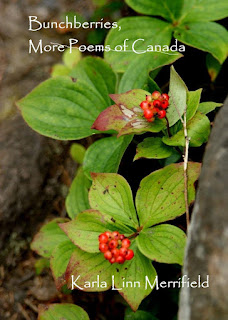Bio: An eight-time Pushcart-Prize nominee and National Park Artist-in-Residence, Karla Linn Merrifield has had some 500 poems appear in dozens of journals and anthologies. She has ten books to her credit, the newest of which are Lithic Scatter and Other Poems (Mercury Heartlink) and Attaining Canopy: Amazon Poems (FootHills Publishing). Forthcoming from Salmon Poetry is Athabaskan Fractal and Other Poems of the Far North. Her Godwit: Poems of Canada (FootHills) received the Eiseman Award for Poetry and she received the Dr. Sherwin Howard Award for the best poetry published in Weber - The Contemporary West. She is assistant editor and poetry book reviewer for The Centrifugal Eye (www.centrifugaleye.com), a member of the board of directors of Just Poets (Rochester, NY), and a member of the New Mexico State Poetry Society, the Florida State Poetry Society and TallGrass Writers Guild. Visit her blog, Vagabond Poet, at http://karlalinn.blogspot.com
To order a copy of this book contact the publisher Foothills Publishing here. Though their website has not been updated, I suppose they will offer a possibility that you order Karla's latest poetry book through the mail.
Excerpt from the foreword by Walter Ruhlmann with excerpts from some of the poems
Right from the title, Bunchberries, we are delivered to the natural beauty of the land as the Latin name for bunchberry – cornus canadensis – implies. From the first poems already so many places, swirling as many shots, postcards, flashes transport the mind to Canada beyond all one can imagine, like a jewel in the crown breathing in the Maritimes: Cape Breton, highland meadows, North Atlantic storms, gray seals, Lake Keiji, Brier Island, the Bay of Saint Lawrence, Nova Scotia.
And unsurprisingly ferries getting people in and out, crossing seas or bays, are at the centre of these first poems too, as this land from sea to sea offers more than vast lands, no less vast shores, and maritime landscapes. Now playing “The Pirate of Penance” and reading “Special Load”:
I transport local traffic year-round and tourists
in the summer. Mostly cars, pickups, delivery trucks
and once a month that pint-sized fuel tanker bound
for the gas pumps at Lechabeau’s General Store.
Never a semi, no further roads for such anyway.
No, nary a big boy for Old Joe, old Joe Casey.
It is also something peculiar to go from one language to the other, as one would go from land to land. A godwit in French is une barge, a barge is.. well, a barge in both languages, isn't it? Maritime-drawn. Karla uses French words especially in her poems where Quebec is the landscape. C'est quelque chose de merveilleux – It's something wonderful (to give Karla her wink back) – to read these poems where I imagine her making her French phrases surface again when purchasing items from the local grocery store “Speaking of Québec”.
I’ve fallen back into it
after ten days across Quebéc:
le français.
I ask for directions
to the marché d’alimentation,
locals’ mouthful for grocery store.
When I need to flip a new Bic
for my foul habit,
I manage to sputter
Est-ce vous avez des alumettes
pour les cigarettes?
Lost in fog too, and smell of roses. Like the memory blanks, in “Proper Adornment” (quoted bellow) where the poet, dazzled by the glittering sea glass that may not be what it looks like, relishes on a piece of driftwood that lost both memory and bark. I also recognise the fog the waitress is lot in “Lost and Found in Les Madeleines” a Proustian poem where the poet herself cannot find the French word brouillard anymore. Fog where the bodies of the departed are lost in, then found again, on the shores of Prince Edward Island on Cabot Beach.
This is the beauty
to be had
at Cabot’s Beach:
the glittering litter
not of sea glass
pocketed to take home
but the mantle, the jewels
of the dead and gone
to remember.
